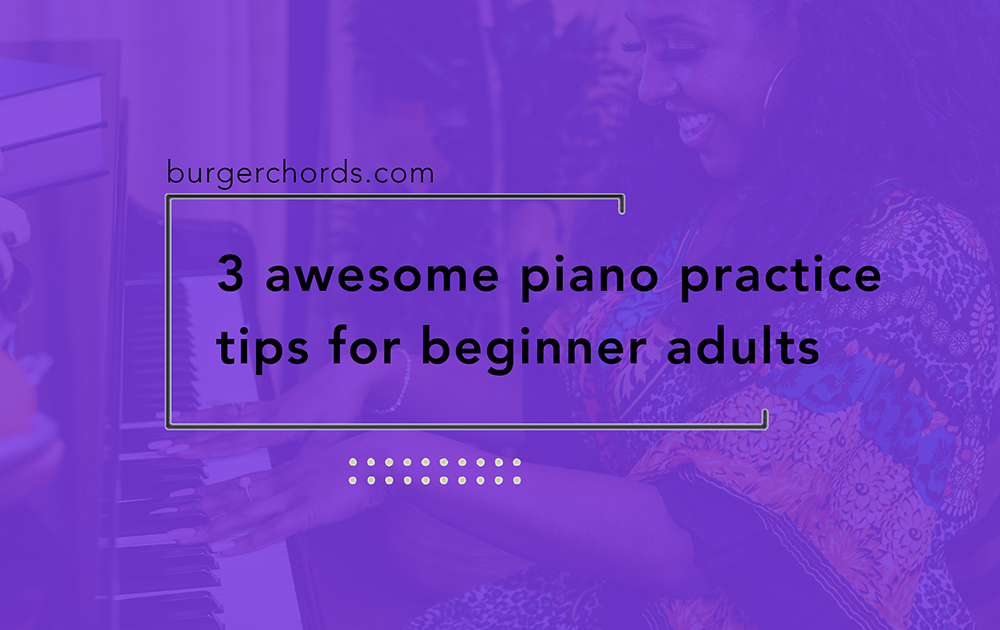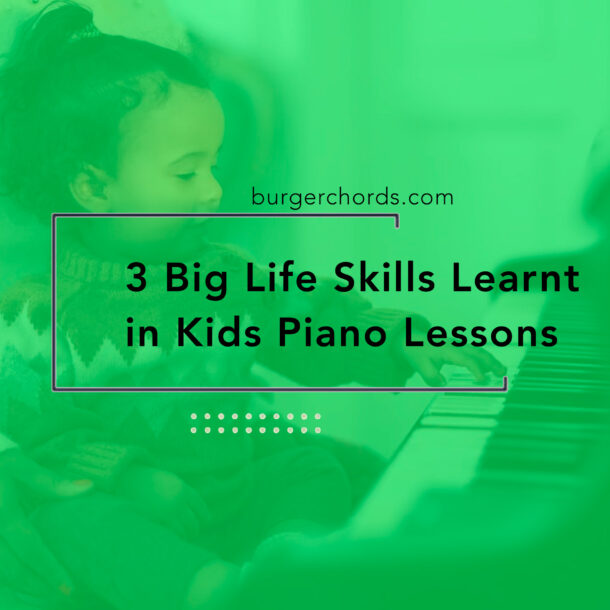

Piano practice and attending lessons each week as an adult has its own unique challenges that differ from our child counterparts. But by-gosh the rewards are so amazing when, as an adult, you approach music learning on your own accord! In this blog post, we’ll go through 3 practice tips that address the most common struggles with beginner adults learning to play piano.

Piano Practice Tip #1: slow down
Here’s a surprising fact: adults learn music faster than children.
Unlike kids, adults already know how to count and read, and have developed muscles to have better motor skills. And by virtue of age, adults have spent far more time than children have hearing music. Singing it in the shower, and dancing along to a beat (insert past memories of clubbing or moshing or hearing the Mario Kart music over and over etc!)
Sure, kids learn fast. But they have so much other learning to do (reading, writing, motor skills etc), that music lessons for kids progress in much smaller increments than adult lessons do.
Regardless of ability, adult piano lessons progress in difficulty much faster than kids lessons.
While this is great news for adult beginners to piano lessons, this can also be a curse. In that, along with the ability to learn music skills faster, adults also expect to progress and master these music skills faster too. We know what music should sound like, so when our piano playing sounds slow, well…you probably know the feeling.
So if you feel like you’re progressing slowly, be rest assured that you’re not. Most likely, you’re probably learning really fast.
If you’re thinking that it’s taking forever to learn Für Elise, keep in mind that it’s an AMEB Grade 5 piece.(The highest AMEB level is Grade 8, so Grade 5 is an advanced level that takes years to reach).
Therefore, take a breath. Slow down. Rather than rushing to finish songs in a particular timeframe, reframe your focus on practicing and playing frequently and regularly (10-15 mins, 4 days a week is great!!). I promise, you’ll see amazing progress by simply slowing down.
What are AMEB piano exams? Read more about AMEB Piano and AMEB Piano For Leisure exams here >>

Piano Practice Tip #2: pick songs to learn that you actually love
There are so many techniques to piano practice. It’s amazing the lifetime of learning there really is.
But the thing that’s always fascinating to me is that you can play music regardless of technique and ability. I constantly meet people playing in bands and creating music with no formal music training. And one trait they possess is the stubborn will to learn and emulate their favourite songs and artists.
With my piano lessons, I’ve found the same. Students that really LOVE the songs they’re playing tend to find regular practice much easier. Similarly, students who come to lessons with a list of favourite bands and artists tend to fare better than students who don’t listen to much music.
This makes sense! As you practice, you’ll hear that song over and over and over again. So if you already listen to that song on repeat, then you’ll find the whole practice process MUCH easier! If you aspire to your music heroes, then returning to your instrument day after day is much less a chore and more a musical path you’re adventuring towards.
So pick songs to learn on piano that you love! There’s plenty of sheet music and YouTube tutorials out there. If you’re struggling to think of songs, go and listen to more music! And make a list of top 3 artists and songs you love.
Piano Practice Tip #3: setup your piano ready to play
This one’s easy but actually kind of hard.
Notice any barriers going directly to play your piano?
For example, extra steps to to playing piano could be opening the lid, plugging it in, putting on headphones, finding your sheet music, having a keyboard stand that’s hard to put up and down, the piano room being too cold.
All of these barriers contributes to “task resistance”. The procrastination you feel when you need to learn a new skill or task – such as piano practice
One effective way I’ve found to overcome this “task resistance” is to eliminate every tiny step there is between simply sitting down and starting to play.
So if you have a lid on your piano, leave the lid open. If your piano needs to be plugged in, find a permanent way to plug it in and leave it plugged in. If your piano needs to be set up, try to find a spot where you can set it up permanently. As I said, this is an easy idea, but if you live in a smaller or shared space, this can be a hard ask. But do try to chat with your household, you might be surprised with what they might be OK with!
Other ideas are to leave your sheet music open and ready to the pages you’re practicing. Have a pencil and eraser on the piano. Dedicate a pair of headphones (can be cheapie set!) to leave it plugged in. Put music apps like timers and metronomes together so you can find them quickly.
One by one, try to eliminate as many “barriers” to playing as you can. By having everything being ready to play, you’ll increase your chances (and joy) of actually playing!
Ready to try a piano lesson?
Conclusion
These 3 piano practice tips are some common things I’ve noticed with myself and my own adult piano students. Having taught kids and adults for over 15 years, and being a lifetime music student as a kid and an adult myself.
If you’re an adult beginner, I encourage you to give these 3 piano practice tips a go! Wherever you’re at with your musical adventures, I sincerely hope you can keep on playing 🙂

About the piano teacher
Michelle is a freelance pianist and piano teacher who aspires to make music fun and accessible for anyone who wants to play. She’s been playing and teaching piano to kids and adults for over a decade, and brings good vibes playing piano for weddings and events at Michelle Plays Piano.
Michelle also plays drums in post-punk and indie bands around Melbourne, and has written about bands for The Music and EARMILK. When she’s not obsessing over music, she’s probably thinking about food.



